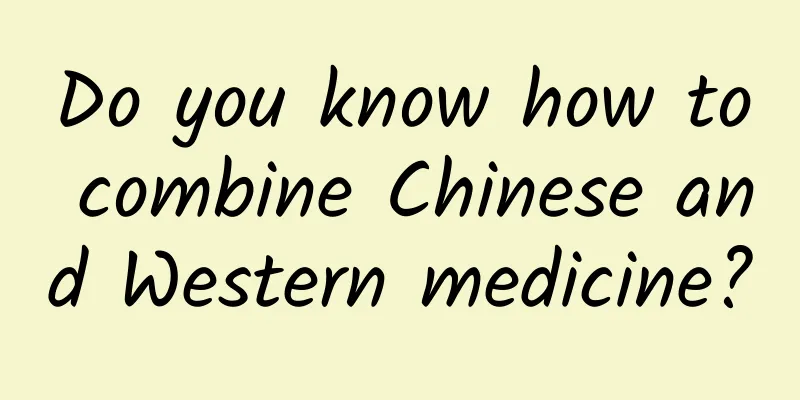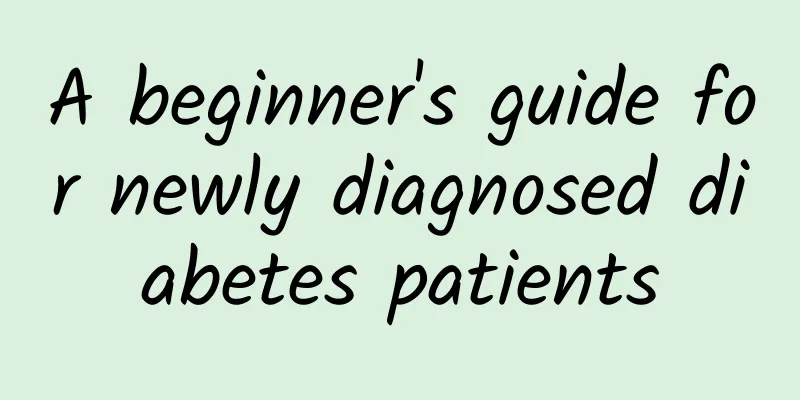Do you know how to combine Chinese and Western medicine?

|
Everyone says that the combination of Chinese and Western medicine has good curative effects. So, what is the combination of Chinese and Western medicine? Does taking Chinese and Western medicine together mean the combination of Chinese and Western medicine? Regarding this issue, some people agree with the above view. The main reason for this concept is their experience and feelings in daily life. For example, when they have an infection that causes a sore throat and bacterial infection, they will take antibiotics and anti-allergic drugs while taking Chinese herbal cold medicines, and feel that the final effect is relatively ideal, and the cold can be cured in a very short time. For example, for some patients with coronary heart disease, in addition to using aspirin and statins in daily life, they will also take some Chinese patent medicines that can protect cardiovascular and cerebrovascular vessels, and the final effect is also relatively ideal. In fact, this treatment method is very common in clinical practice. Therefore, based on the current clinical status and related aspects of drug treatment experience, Chinese medicine and Western medicine are used together, that is, the combination of Chinese and Western medicine. The picture comes from the Internet But is it really that simple? According to medical theory, it is obvious that the combination of Chinese and Western medicine is not that simple. The above-mentioned view is merely a combination of Chinese and Western "medicines", not a combination of Chinese and Western medicine. What does this mean? Take the example of a sore throat and bacterial infection after a cold mentioned above. In this case, people will use Chinese patent medicine while taking antibiotics. Although this drug treatment method seems to be a combination of drugs, it actually has big problems. For example: From the perspective of Western medicine, will the use of Chinese patent medicine produce antibacterial effects? If the medicine has an antibacterial effect, then when the Chinese patent medicine is used in combination with antibiotics, will the final result be to enhance the efficacy of the antibiotics, or will the therapeutic effect of the antibiotics be hindered? If there is a hindrance, what should be done if the original drug effect of the medicine is lost? The picture comes from the Internet From the perspective of traditional Chinese medicine: What are the four properties and five flavors of antibiotics? When antibiotics are combined with various Chinese patent medicines used in clinical practice, will there be a conflict of cold and heat properties? How strong are the antibiotics used? Will there be a situation of cold damaging Yang after use? The picture comes from the Internet From a pharmaceutical perspective: Are there any interactions between antibiotics used in clinical practice and Chinese patent medicines? For example, whether there are corresponding physical reactions after direct contact, whether there are reactions of drug metabolizing enzymes, and whether these reactions lead to enhanced or weakened drug efficacy, these cannot be answered. From the perspective of adverse reactions: When antibiotics are used in combination with Chinese patent medicines, will new adverse reactions occur? Will they aggravate the symptoms of previous adverse reactions? From the perspective of specific medication: When Chinese and Western medicines are used together, which medicine should be taken first and which medicine should be taken later? Should there be a certain interval between the use of medicines? Is there a certain difference when taking the medicine before or after meals? Are the two medicines taken for the same number of days? There is actually no real way to answer these questions. In many cases, they are just empirical knowledge or exploratory attempts. Why do we need to pay attention to these issues? This is because if the two drugs used are both Western medicine or Chinese medicine, then we can use our own therapeutic theories in our respective medical systems to solve and answer the corresponding problems. However, if one is Chinese medicine and the other is Western medicine, then it is difficult to get the above answer. Therefore, at least we need to know that taking Chinese and Western medicines together is just a combination of Chinese and Western "medicines", not a true combination of Chinese and Western medicine. So, how should Chinese and Western medicine be reasonably combined? The picture comes from the Internet 1. Rational combination of Chinese and Western medicines to enhance efficacy Traditional Chinese medicines such as Panax notoginseng, red medicine and turmeric can be reasonably used in combination with Western medicine lactic acid cardiotidine. In general, this drug combination is used in patients with coronary heart disease and angina symptoms, which can greatly improve the final treatment effect. Patients should take the medicine according to the accurate doctor's instructions, and then the patient's coronary blood flow will increase to a certain extent, thereby achieving the drug effect of dilating blood vessels, lowering blood pressure and lowering blood lipids. The traditional Chinese medicine compound Danshen injection can be used in combination with the western medicine dopamine. Under normal circumstances, this combination of drugs is used in patients with chronic cor pulmonale and sexual dysfunction, which can significantly shorten the time for patients to correct their heart failure. At the same time, when patients take the relevant drugs for a week, they will not experience more obvious discomfort symptoms. Ingredients such as berberine and phellodendron chinense contained in traditional Chinese medicine can be used in combination with Western antibiotics. Under normal circumstances, this method of use of drugs is used for patients with bacterial diarrhea caused by Escherichia coli. The relevant characteristics of berberine can inhibit the intestinal secretion process, thereby enabling the diarrhea to be controlled more quickly and preventing patients from developing more serious bacterial infections. 2. Reasonable combination of Chinese and Western medicines to complement each other and reduce toxicity In the current clinical treatment process, there are many chemical drugs that have good therapeutic effects but produce large side effects, so doctors have to limit the scope of clinical use of these drugs. However, when they are used in combination with corresponding important drugs, their toxicity can be reduced, allowing patients to obtain closer to ideal treatment results during the use of these drugs. For example, the Chinese medicine licorice and ginseng soup can effectively alleviate the difficult-to-withdraw reaction caused by Western hormone drugs; the combined use of glycyrrhizic acid monoammonium salt and Western medicine containing camptothecin can reduce the probability of adverse leukocyte reactions in patients; the combined use of pearl powder and chlorpromazine can reduce the side effect of liver cell damage caused by Western medicine. The combination of the two drugs can alleviate the abnormal liver function of patients and achieve good treatment results. 3. Rational combination of Chinese and Western medicines to promote immune regulation For patients with long-term chronic diseases or tumors, their immune function status plays a very important role in disease recovery. The reasonable combination of Chinese and Western medicines can well regulate the patient's current immune function, improve the patient's physical fitness, and have a higher quality of life. The mismatch between the therapeutic mechanisms of Chinese and Western medicines and the inappropriate usage and dosage of Chinese and Western medicines can easily lead to adverse reactions, which is not conducive to the control of diseases and the development of Chinese and Western medicine diagnosis and treatment methods. Therefore, doctors who combine Chinese and Western medicine should have a deep understanding of the mechanism of action, incompatibility, etc. of Chinese and Western medicines, and improve the reasonable combination of Chinese and Western medicines, so that patients can receive more ideal treatment in the clinic, recover health faster, and improve patients' physical adaptability and resistance to external infections. |
<<: Is prenatal ultrasound examination necessary?
>>: Kenshoo: Mobile ad revenue now accounts for a large portion of Facebook's global ad revenue
Recommend
Lying down and playing with mobile phone every day during pregnancy
Many pregnant women will have someone advise them...
How many days does a woman need to rest after a medical abortion?
No matter what kind of minor surgery you have, yo...
Frequent urination at night, is it a sign of kidney problems?
Netizen question: My dad has been having to get u...
Yellow nasal discharge in late pregnancy
The discharge of a lot of runny nose-like secreti...
What are the benefits of eating pomegranate during pregnancy for the fetus
Pregnant women must pay attention to dietary bala...
Symptoms of successful intercourse during ovulation
There is a process from female ovulation to conce...
Milky white fluid coming out of breast
Breast disease is one of the biggest killers that...
Treatment for back pain after cesarean section
Many women know that menstruation is very importa...
Will the stitches split after cesarean section removal?
It is possible that the wound will split after th...
How long does it take for the fetus to absorb the food that a pregnant woman eats?
Everyone understands that things cannot be accomp...
Can I still get pregnant after having my fallopian tube removed?
Many women experience ectopic pregnancy. In this ...
What are the steps for laparoscopic fallopian tube removal?
No woman is willing to undergo fallopian tube rem...
If the examination finds "big three positives" does it mean that you have hepatitis B?
Rumor: Is hepatitis B the same as hepatitis B? — ...
Menstruation is light and long
With the increasing pressure of life and work and...
How to prevent colds during the dog days? What to do if you catch a cold during the dog days
Summer is really super hot, and many friends don’...









